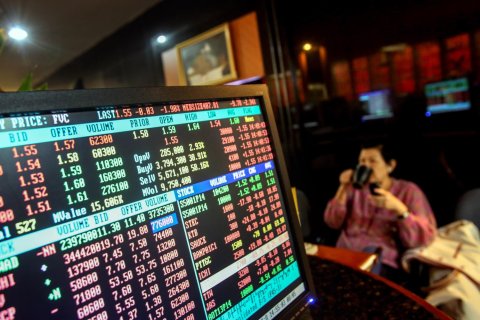Showing 1 - 10 of 7,149
Fuel usage declined 0.2% in 2025
Business, Yuthana Praiwan, Published on 13/02/2026
» Thailand's total fuel consumption dipped slightly last year, falling by 0.2% year-on-year due to the economic slowdown, says the Department of Energy Business (DOEB).
Election result to keep foreign funds flowing
Business, Published on 13/02/2026
» Stock market analysts expect foreign funds to keep flowing into Thailand as the decisive general election outcome signals stronger political stability and reduces the risk of extreme populist policies, keeping fiscal discipline intact.
Retailers urge measures to stimulate economy
Business, Post Reporters, Published on 13/02/2026
» The Thai Retailers Association (TRA) is proposing a comprehensive package of urgent policy measures to stimulate the economy dubbed "Value Shopping – Tourism Boost – Local Investment – Strong SMEs – Skilled Workforce – Fair Competition".
Major Thai chains reduce sugar in beverages
News, Post Reporters, Published on 12/02/2026
» Nine major Thai beverage chains have partnered with the Department of Health to introduce a new standard for drink sweetness aimed at reducing sugar consumption and lowering risks of obesity and non-communicable diseases.
Violent protests greet Argentine labour reforms
AFP, Published on 12/02/2026
» BUENOS AIRES - Argentine workers hurled stones and bottle bombs Wednesday at police who responded with tear gas and rubber bullets as a protest against proposed labour reforms turned briefly violent.
Thai growth seen at just 1.5% to 1.75% this year
News, Post Reporters, Published on 12/02/2026
» The Thai economy is expected to expand by only 1.5% to 1.75% this year, says a public opinion survey by the University of the Thai Chamber of Commerce (UTCC).
UOB: Economic growth depends on stability
Business, Somruedi Banchongduang, Published on 11/02/2026
» Effective implementation of the new government's policies will be pivotal in building investor confidence and attracting both foreign portfolio inflows and foreign direct investment (FDI) into Thailand, according to UOB Thailand.
Analysts raise SET outlook following Bhumjaithai victory
Published on 10/02/2026
» Bhumjaithai Party's landslide election victory could lead to a swift formation of the new government and policy continuity, prompting a post-election rally that saw analysts lifting their Stock Exchange of Thailand (SET) index estimates for 2026.
Clear Thai election victory to give investors policy continuity
Published on 09/02/2026
» A convincing win by Thailand’s ruling Bhumjaithai Party in Sunday’s election should boost the country’s stock market and currency, according to some strategists and economists, with the potential for policy continuity a relief for investors who’d feared further political dysfunction.
Carbon rules reshape Thai business as CBAM looms
Business, Yuthana Praiwan, Published on 09/02/2026
» The European Union's Carbon Border Adjustment Mechanism (CBAM) is sending ripples of concern throughout global trade, unsettling exporters of certain products while raising broader questions about its long‑term impact on industries not yet covered by the measure.













